From the Director of Early Learning
Dear Families

As we commence a new term, it is important to remind ourselves of the purpose of our partnership and responsibility in educating each of your children. Last week, I attended the fourth annual ACEL Early Childhood Conference in Sydney, where the research was again presented about the significance of education during the early years. The research states that high quality early years’ education gives a developmental advantage of up to eight months for a child entering school.
Your choice in selecting a centre that provides such a rich learning environment is crucial. In addition, the time you as parents spend with your child at home in rich shared experiences is of the utmost importance. Together, this enables your child to receive the benefits of language learning at the age when brain development is at its peak. The affirmation of this research is critical in recognising that we are so much more than child care.
Term 2 is another exciting term where we can build on the wonderful beginning to our year. There are several events for families to be involved in including Mothers and Special Friends’ Afternoon Tea, and our Ladies’ Day Out. These events provide opportunities to meet with others within our community to form and build upon important relationships.
In addition, we have our Parent-Teacher Conversations which will give the teachers a chance to share your child’s learning journey with you, and the documentation that supports their progress on their goals. We hope you have all managed to find time to make an appointment. Please follow the details in the email that was sent to you at the beginning of this term if you haven’t already booked.
We are very excited to welcome Ms Mel Angel back from her Reggio Emilia Study Tour. Mel was among a large international group of educators who travelled to Reggio Emilia in Italy to discover more about this incredible educational research that has impacted on countries world-wide. You can read more about her journey and her learning in the article below.
This term, we welcome some new staff members. In the Ferguson Room, we welcome Mr Joshua Romeo and in Stonyfell, we welcome Miss Emily Downie. During this term, Miss Henrietta Balnaves will be absent from Week 4 until the end of term as she undertakes her prac experience. We have appointed Mrs Alice Kennett to cover her role. In addition, we are welcoming a few new relief staff.
We hope the term brings us new adventures and opportunities to share in your child’s learning. We look forward to meeting with you all soon.
Kate Mount
Director of Early Learning
Save the Date
Friday 10 May: Mothers and Special Friends’ Afternoon Tea, 2pm
Monday 13 – Wednesday 15 May: Parent-Teacher Conversations
Sunday 26 May: Ladies’ Day Out
Monday 3 June: Mid-Year Reception Transition Visits Commence
Monday 10 June: Public Holiday (ELC closed)
Parent-Teacher Conversations – Term 2
ELC Parent Teacher Conversations will take place between Monday 13 May and Wednesday 15 May. There are designated 15 minute time slots to meet with your child’s teacher.
We strongly encourage you to book a meeting as it provides us with the opportunity to share your child’s learning journey, significant moments and documentation that we have to support this. From these discussions, future goals for your child may be created to ensure they reflect the perspectives of families and educators.
Bookings are now open and can be made online via myLink.
Reggio Emilia Study Tour
“You don’t understand the schools of Reggio Emilia if you don’t understand the city, the community.” – Jerome Bruner
At the end of last term, I travelled to Reggio Emilia, Italy for a 10 day intensive study tour. This opportunity has had a huge impact on my understanding of the philosophy and the pedagogy of the Reggio Emilia approach that, in 1996, was named among the top 10 schools in the world according to Newsweek magazine. This reputation has never diminished. There were 460 participants at the conference from 43 countries, which is a significant indicator of how widely this innovative and progressive approach to teaching young children is embraced.
So, what is so special about the Reggio Emilia approach and why is going there in person so important?
Educators in Reggio Emilia have always regarded children as extremely strong and capable. Adults have a role not only as teachers but as learners and researchers, working alongside children to discover, create and develop understandings about the world. The philosophy and pedagogy is underpinned by a set of principles that are at the heart of all of the planning, with the processes and projects being vehicles to develop values such as listening, empathy and respect.
Italian life has shaped the philosophy and the pedagogy, and visitors only need to spend time in the piazzas of any city in Italy to see how connection, communication, beauty, art and history are central to the cities and the community. Seeing this first-hand has deepened my understanding of these fundamental values, and while I know that our context here in South Australia is very different to that in Reggio Emilia, I hope to embed these values that connect us more deeply to each other with more confidence and clarity than before.
I am very grateful to St Peter’s Girls’ School for giving me this opportunity and look forward to sharing what I have learned with our community over time.
Mel Angel
Thunderstorm Dancing
This term, the children in Learning Community 2 have spent time exploring our central idea that ‘working together can create communities’. Inspired by our Atelier of Sound, the children quickly decided to form a band to make a song for all of their friends.
By providing a strong focus on literature, digital technologies and the expressive languages of music and dance, their ideas were enhanced. The gift of Thunderstorm Dancing, a symphony of movement and sound, evolved.
Watch our video below to experience the joy of Thunderstorm Dancing!
Mothers and Special Friends’ Afternoon Tea
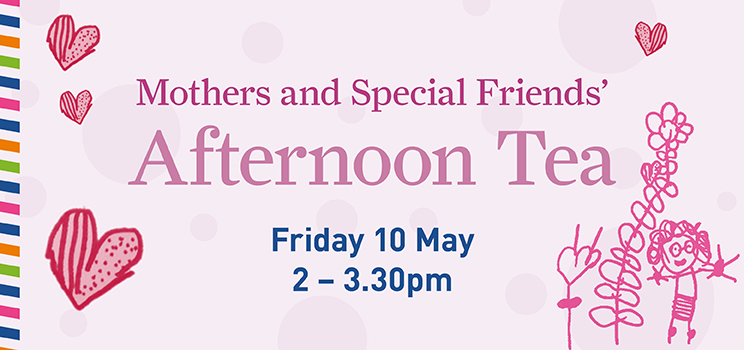
You are invited to an afternoon tea celebrating the inspirational women in the children’s lives including mothers, grandmothers and aunties.
Friday 10 May
2 – 3.30pm
ELC Garden, Hallett Road, Stonyfell
There will be a gold coin donation box for The Cancer Council at this event to support breast cancer research.
Saints Girls has arrived on Instagram!

St Peter’s Girls is proud to launch our newest social media offering to celebrate our wonderful community.
We look forward to sharing exciting images and cutting-edge videos showcasing life at Saints Girls. Be a part of the action and follow us via @stpetersgirlsschool or by clicking here.
Accessing your Child’s Canvas Page
Your child’s Canvas homepage is a dynamic online sharing space that invites you to participate in your child’s learning as it happens. It provides a window into your child’s life at the ELC as educators share intentional teaching, specialist lessons and spontaneous moments.
We can share videos and images directly with parents that capture the rich learning experiences in which your child is engaged throughout their time at the ELC. The Canvas homepage also enables us to share more of the process of learning – rather than just the end product.
Your child’s Canvas page is accessed through the myLink Parent Portal. If you have not accessed your child’s Canvas page before, please follow these instructions:
Accessing Canvas for the first time:
- Visit https://mylink.stpetersgirls.sa.edu.au
- To set your first password, click the link below the sign in section
- Enter your username, click ‘Next’
- On the next screen, enter the security code emailed to you
- Enter the password you would like to use and press submit
- Return to the login screen at https://mylink.stpetersgirls.sa.edu.au to access myLink
- Several instructional videos are available via the Welcome page if you click on the ‘HELP’ menu tab.
Accessing Canvas through the myLink parent portal:
- Access myLink as per above instructions
- Click on the ‘MYLINK HOME’ tab
- Click on your child’s name tab
- Under ‘class contacts’ click on the ELC room name (You may need to enter your parent username and password again)
If you have any problems accessing or navigating myLink, please contact the IT Helpdesk on 8334 2227 or email helpdesk@stpetersgirls.sa.edu.au.
Photo Etiquette:
Please note that your child’s Canvas homepage and Portfolio will contain some images and video footage of other children. We therefore ask that you do not copy or share images or videos, especially on social media, if they contain other children.
来自黄老师的信息
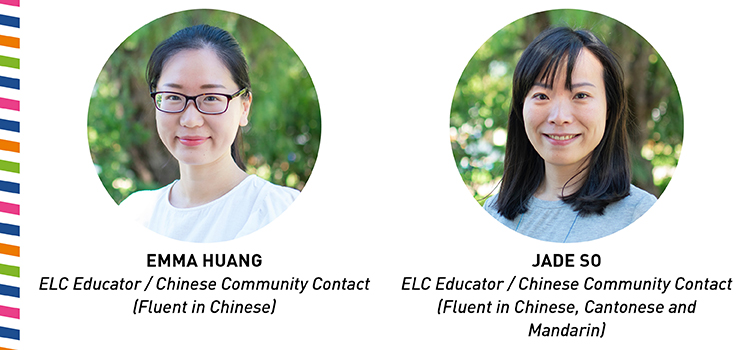
亲爱的家长朋友们,
您们好:
在这秋高气爽的季节里,我们迎来了第二学期。对于整个学年来说,这个学期又将会是一个美好的开始。
在这里,我们向家长朋友们分享一下近期重要的活动:
- 5月10日 星期五下午2:00-3:30 母亲节下午茶
- 5月26日 星期日上午11:00 女士外出日
这些活动为我们提供了一个很好的互动交流的平台,也让我们社区变得更加紧密。
另外,5月13日(星期一)到五月15日(星期三)这三天是我们十分重要的一对一家长会日。我们的老师将会和家长朋友们分享您孩子在ELC的学习进步情况。这也有助于我们更好地了解您们对孩子的期望值。
我们期待家长朋友们在收到邮件以后,尽快和老师们预约家长会时间。如果您有任何疑问可以咨询我们的老师们。
祝好
黄老师
Emma works in Learning Community 2 on Mondays, Thursdays and Fridays from 9am – 5pm, and Jade works 11am – 6pm every day in Learning Community 1.
Enjoy a Ladies’ Day Out
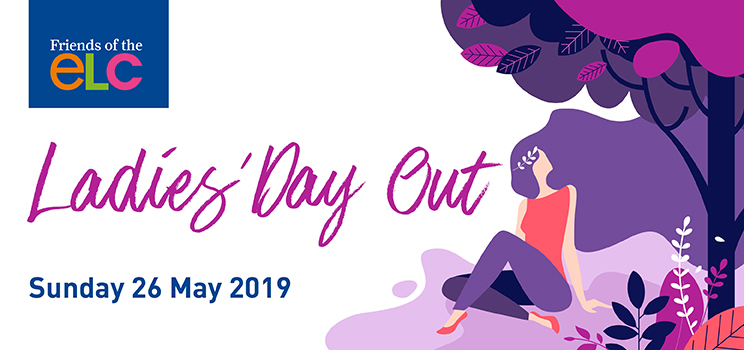
Join us for a relaxing day out, especially for mums, on Sunday 26 May at Golding Wines, Lobethal. The bus departs School at 11am and returns at 5pm.
The cost is $75 per person and includes a four-course share menu for lunch, and bus transfer to and from the venue. Drinks can be purchased on the day. There will also be fantastic raffle prizes to win.
Book your ticket via www.trybooking.com/BBYQR
Friends of the ELC
Learning Community 1
News from the Stonyfell Room
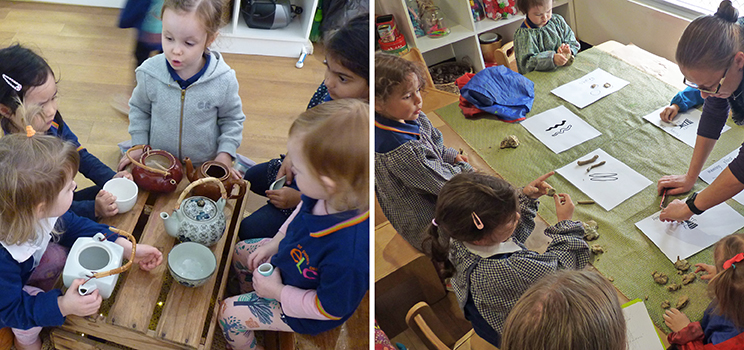
We hope that you all enjoyed a break over the Easter and Anzac Day period. We have noticed that the children are refreshed and enthused about being back at ELC and we are so eager to see them and to reconnect as a learning community.
In Term 2, we will continue with our inquiry-based learning that was at the heart of our work in Term 1. These inquiries include the exciting exploration of Kaurna language and culture, and the investigation of fruits and vegetables which encompasses planning for a new community garden in the ELC. All of the children in the Stonyfell Room and the Bell Yett Room will be engaged in these inquiries, and there are many different avenues for them to gain deeper understanding of these concepts. We know that children have their own unique and preferred styles of learning, and our responsibility as educators is to discover and appreciate these preferences. We can then provide opportunities for them to express themselves and their curiosities in these ways. In the Reggio Emilia approach, this is referred to as ‘the hundred languages’. This is a metaphor for the many possibilities there are to introduce concepts to children and to resist assuming that one or two ways can suffice for all. For example, the children have many opportunities to learn and use Kaurna language:
- Singing a variety of songs every day in Kaurna language
- Using musical instruments and dance to ‘feel’ the language
- Using the languages of materials such as clay, pens, paper and paint to represent Kaurna symbols
- Interacting with Tamaru, our Kaurna friend and Elder who visits us regularly, who shares his knowledge with us and inspires the children with his fun and engaging ways of teaching
- Continuing this learning in Ferguson Park which is a unique context for children to relax and connect with nature
- Using the digital language of our ActivTable, where children can manipulate photographic images of symbols, digitally draw their own symbols and construct knowledge and understanding as a group, influencing and inspiring one another
- Making our daily acknowledgement and expressing thanks to the Kaurna people to further understand reconciliation and our commitment to the first Australians
This is an example of the way we are living our central idea this term which is ‘Democracy can strengthen communities’. Democracy is a concept that implies participation, the rights of both the individual and the group, and truly listening to one another with respect and empathy. When we offer children choices, we are respecting their right to participate in our community, in the learning processes and in making choices about their daily life. We are excited to explore this as a teaching team and role model this way of being to the children.
We look forward to sharing our stories, photographs and documentation with you in our daily interactions, on our Canvas page each Friday, on the walls of our room and in the forthcoming Parent-Teacher Conversations. As the parents/carers of the children we teach and learn alongside, you are valued and key participants in our community; your participation in our decisions and planning is vital.
Mel Angel
News from the Bell Yett Room
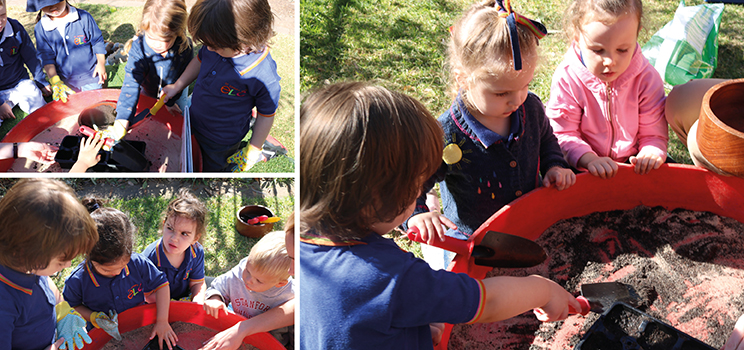
Throughout Term 1 in the Bell Yett and Stonyfell rooms, we witnessed the growth of a community, built on the foundations of inclusion and our awareness of others. We built a community for which we are a part of each day. But how do we all participate within it? What skills are needed for our community to function effectively? How do our children develop these skills in intentional learning experiences and in their play?
At the beginning of the week, we set up a seed planting experience. After discussing the instructions, the educators stood back and allowed the group to take control. Immediately, a number of problems were identified within the group: there were only three spades, one pot, one plate of seeds and not much space to sit down. Collectively, the group’s first reaction was to bring these problems to the attention of the educator. The educator replied:
“These are your seeds. Can you decide what to do?”
What followed was a string of examples of the types of skills needed for a group to function effectively. We observed verbal explanations of the need to pass the plate of seeds around the circle so no one ‘missed out’. We watched a silent trade of a spade for a spray bottle. We listened to children explain to one another that their turn was coming up. Mishali pointed out to us that if one person “looked after the seeds”, then another could “help with the soil”. The group listened to each other’s theories about the best ways to get the seeds in the soil, and tested each other’s ideas. After children had a turn planting, they looked behind them at the others waiting and made a space for them in the circle.
Soon, all the seeds were planted and the group was happy with their finished product.
“We did it!” – Yaseen
The group built the experience together through:
- Problem-solving
- Identifying and negotiating roles
- Sharing
- Listening
Our children already have an understanding of the skills necessary for a group to function effectively. As educators, we feel a responsibility to observe for evidence of these skills and for opportunities to grow them so that they become intrinsic. Through our central idea this term that ‘Democracy can strengthen communities’, we will be looking for ways to develop these skills so that our children strengthen their feeling of belonging, work together to make decisions, challenge one another and continue to actively participate within our community.
Annabelle Redmond
Learning Community 2
News from the Ferguson Room
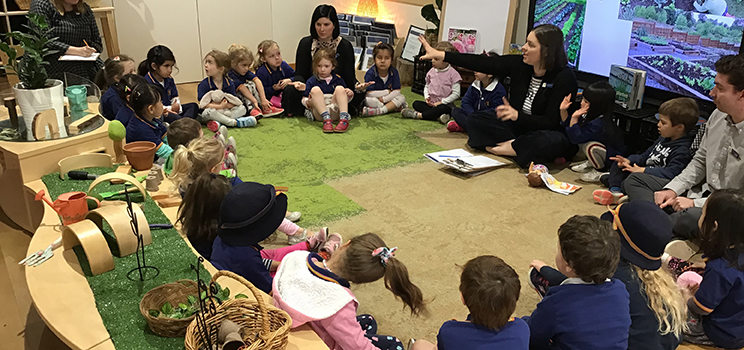
Choice, agency, and developing an awareness of others
Last term, we received a provocation from Shauna. This provocation was in regards to us sharing our small group investigations with the larger group.
“I didn’t know you had done that”, was Shauna’s comment to her educators and peers.
This comment challenged the educators and has become a quote that we often refer back to.
How and why we group children has always been a point of discussion for the educators. We have reflected on this and decided that we want to include the children in these discussions. We asked ourselves, how could we offer the children choice and give them a sense of agency for this part of our day?
During Morning Meeting on Tuesday, the educators shared with the children our intentions. The children were made aware that every group would be working on the same experience, and that they could choose which group that they wanted to work with. The perimeter around this choice was that only seven children could work in each group.
The children accepted the task at hand and were invited to choose the group they wanted to work with. We encountered a problem! Some of the groups were too large. The children were made aware of this and were reminded that each group could only have seven children in it. Children began to express the need to move groups to meet the number requirement that was given to them. This took some time and some negotiation from both the children and educators. Once each group had seven children we began our inquiry work.
This experience taught us about:
- Group decision-making
- Problem-solving skills
- Developing a sense of agency
- Developing an awareness of others
We believe it is important to allow the children to build on these skills and to provide them with the opportunity to explore and practice these fundamental and lifelong skills. Though our central idea for this term that ‘Democracy can strengthen communities’, we will be analysing what this looks like in our community and how we can continue to develop these skills over this term.
Laura Reiters
News from the Hallett Room
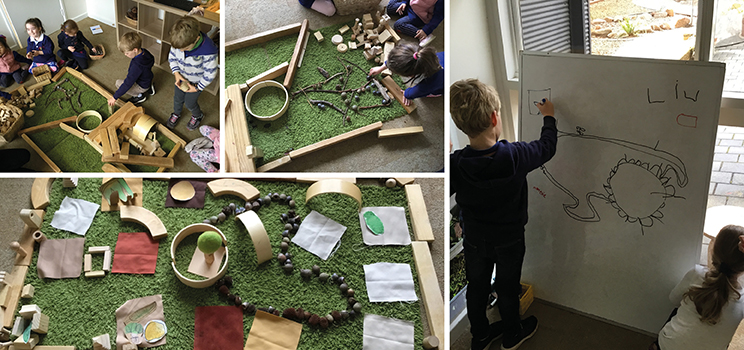
School is not only a place to transmit culture but to create it, to encourage critical thinking, creativity and relationship…
During Term 1, a group of children where provoked by our empty planter boxes in the Hallett Garden. They began bringing in produce grown in their homes to cook and share with their friends. This inspired us to investigate the possibility of creating a Community Garden within the ELC. A space for the garden was sourced and the children have been using digital technologies, mark-making and 3D materials to begin designing the garden.
This week, we invited a group of our ‘experts’ to share their experiences and their thinking with their Hallett friends who were wondering what we were going to grow in the garden. Miss Caterina inspired a deep discussion between the children when she stated, “I want to grow tomatoes and basil and nothing else. They are my favourite.”
“Miss Caterina, it is not your garden, it’s the ELC garden.”
“Everyone needs to choose what to plant.”
“I want to plant broccoli and peas.”
“No, I want to plant tomatoes.”
“You cannot grow tomatoes because it’s winter.”
We wondered, how can we decide what to plant when there are a lot of people in our community?
“We can vote.”
“A vote is when you ask what everyone wants and you plant the one with the most votes.”
Experiences such as these support children to develop the skills needed as citizens in a democratic society. The opportunity to engage in dialogue and debate gives opportunity for critical and creative thinking. This type of collaboration supports us to develop, despite our individual differences, shared values that benefit all.
“No longer can schools simply be reproducers of knowledge. They are places where children and adults construct knowledge and their understanding of the world together.” – Carla Rinaldi
Nell Tierney and Leanne Williams
